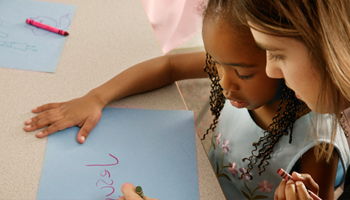HOW CAN WE HELP YOU? Call 1-800-TRY-CHOP
In This Section
What Leads to Challenging Behaviors in Children with Autism?

The findings:
A tantrum, a kick, a meltdown: In school-age children with autism, these aggressive and oppositional behaviors – described collectively as “challenging behaviors” – are some of the biggest struggles reported by parents and teachers. New research from the Center for Autism Research (CAR) at Children’s Hospital of Philadelphia suggests that these behaviors arise when children don’t have the skills they need to cope with situations or problems in an adaptive and healthy way. Working on skills such as emotion regulation, impulse control, cognitive inflexibility, and others that the researchers identified may be a helpful approach.
Why it matters:
When we understand what leads to children’s challenging behaviors, we can learn the most effective ways to kick-start change: CAR researchers hope that the findings will shift the way people see and interact with children with autism who display challenging behaviors. Rather than viewing a child’s negative behaviors as a disciplinary problem, parents and caregivers can look for the source of the behavior in a mismatch or incompatibility between the demands of the situation or environment and what the child knows how to do. Instead of “my child won’t do this,” a parent or caregiver would say, “my child can’t do this right now” – thus providing room for learning and progress. Interventions that involve the Collaborative and Proactive Solutions (CPS) framework possibly offer a new option for supporting individuals with autism and their families by identifying the specific skills a child might lack.
Who conducted the study:
Researchers from CAR conducted the study.
How they did it:
The researchers looked at data from 182 parents of children with autism without intellectual disability through the CPS framework developed by Ross Greene, PhD, adjunct associate professor in the department of Psychology at Virginia Tech and adjunct professor at the University of Technology Sydney in Australia. CPS is a cognitive behavioral treatment used in school-age children with attention deficit-hyperactivity disorder and oppositional defiant disorder to reduce the occurrence of challenging behaviors. CPS hinges on the idea that children react with aggression, defiance, and stubbornness when their skills don’t match what the situation asks of them – whether it’s problem-solving, frustration tolerance, cognitive flexibility, or others.
Quick thoughts:
“An important component of the CPS approach is that it gives agency to the person on the autism spectrum,” said Brenna Maddox, PhD, the study’s lead author who was a postdoctoral fellow at CAR at the time of the study and is now at the University of Pennsylvania. “By helping them to communicate their needs and participate in the solution, they are gaining crucial skills for greater independence as they grow older.”
What’s next:
The CPS treatment has not yet been tested for effectiveness with kids with autism. Dr. Maddox’s research team at CAR plans to test an adaptation of the CPS treatment with children on the autism spectrum in a future study to learn whether it is clinically effective.
Where the study was published:
The study was published in the journal Autism.
Where to learn more:
Visit the CAR Autism Roadmap™ for clinician-reviewed articles on challenging behaviors. Find out more about the CPS approach here. You can also read the study abstract online.


